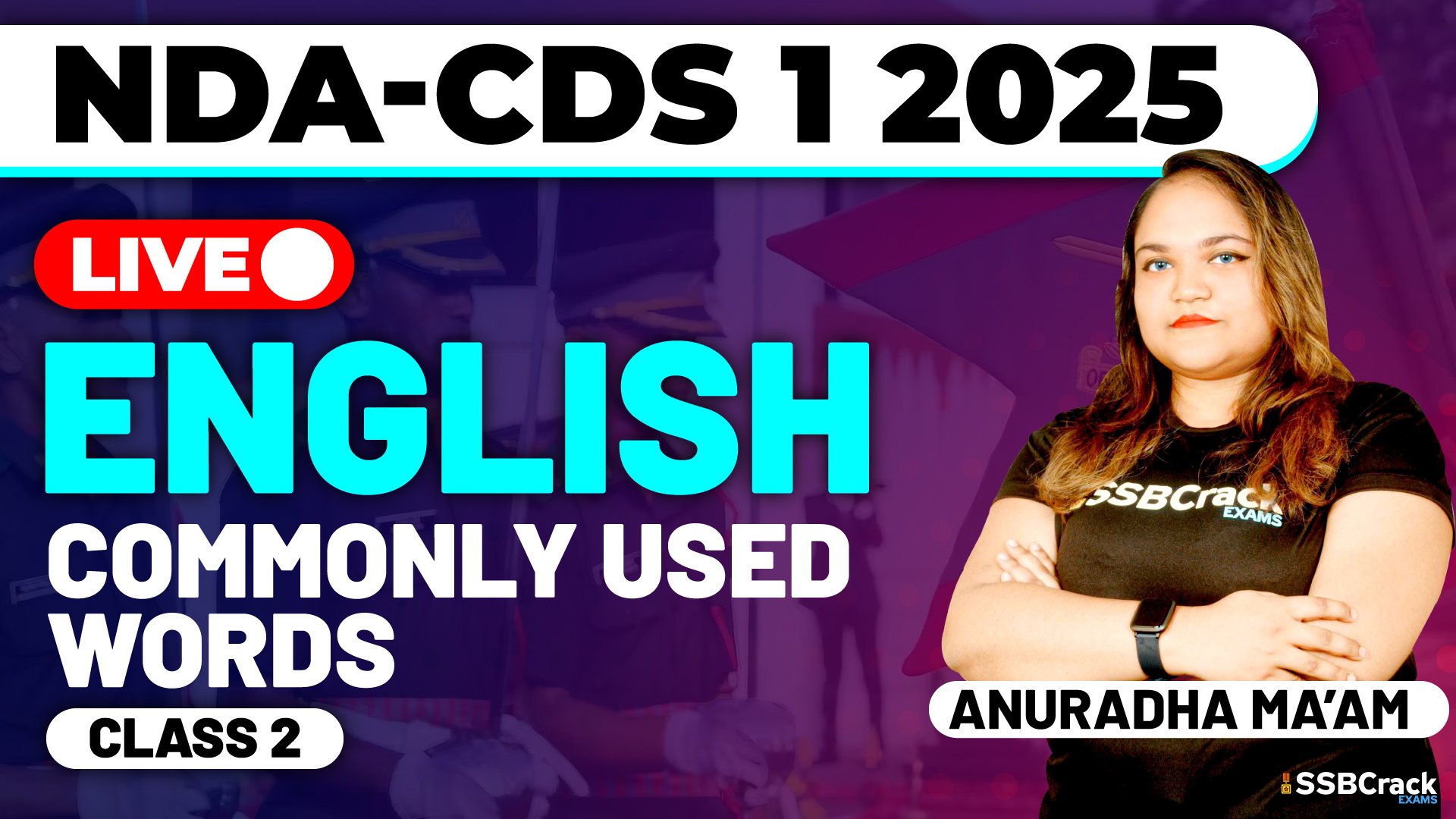In competitive exams like NDA and CDS, the English section serves as a critical benchmark for evaluating a candidate’s command over language. Among various topics, Commonly Used Words stands out due to its practical relevance and consistent presence in the question papers. This topic assesses not just vocabulary but also the ability to apply words correctly in different contexts—a vital skill for future defense officers.
Directions: In the following items, there are two sentences S1 and S2, based on commonly used word(s), which are in bold italics. Read the two sentences carefully and mark the response that denotes the correct use of these words in each of the two sentences and mark your response on the Answer Sheet accordingly.
Q) S1: The devotees came to the temple bare footed.
S2: I cannot bear your insulting remarks.
(a)S1 is right and S2 is wrong
(b)S1 is wrong and S2 is right
(c) Both S1 and S2 are wrong
(d) Both S1 and S2 are right
Ans. (d)
Q) S1: My sister was born in 1995.
S2: The people were suffering from water born disease.
(a)S1 is right and S2 is wrong
(b)S1 is wrong and S2 is right
(c) Both S1 and S2 are wrong
(d) Both S1 and S2 are right
Ans. (a)
Q) S1: I have burrowed some money from Bank.
S2: A mouse lives in this borrow.
(a)S1 is right and S2 is wrong
(b)S1 is wrong and S2 is right
(c) Both S1 and S2 are wrong
(d) Both S1 and S2 are right
Ans. (c)
Q) S1: Many people like to walk along the sea beach.
S2: There are many beach trees near the railway station.
(a)S1 is right and S2 is wrong
(b)S1 is wrong and S2 is right
(c) Both S1 and S2 are wrong
(d) Both S1 and S2 are right
Ans. (a)
Q) S1: Let us bough to our motherland India.
S2: Many birds are sitting on the bough of the tree.
(a)S1 is right and S2 is wrong
(b)S1 is wrong and S2 is right
(c) Both S1 and S2 are wrong
(d) Both S1 and S2 are right
Ans. (b)
For more, check out NDA-CDS 1 2025 Exam English Live – Commonly Used Words – Class 2
Why Are Commonly Used Words Crucial?
- Core of Everyday Communication
These words form the backbone of daily conversations and official communication. Mastering them ensures clarity and precision in both written and spoken English, which is essential for any defense personnel. - Multiple Contexts and Meanings
Many commonly used words have different meanings based on context. For instance, the word light can mean illumination, not heavy, or even something that ignites. Understanding these nuances is essential to answer exam questions accurately. - High Exam Frequency
Questions based on commonly used words regularly appear in NDA and CDS exams. These questions often involve selecting the word that best fits a sentence, testing both vocabulary and contextual comprehension.
Challenges Candidates Face
- Contextual Misinterpretation: The same word might imply different meanings in various sentences, which can be tricky without thorough practice.
- Confusing Options: Exam questions often include options that seem similar, requiring a deep understanding to choose the correct word.
- Overlooking Nuances: Small differences in word usage can lead to incorrect answers, especially when options are closely related.
Insights from Commonly Used Words Class 2
In Commonly Used Words Class 2, we conducted an MCQ session where candidates practiced solving exam-relevant questions. Here’s how the session contributed to their preparation:
- Application-Based Learning
Candidates worked through questions reflecting real exam scenarios, enhancing their ability to identify the correct word based on contextual clues. This practical approach bridges the gap between theoretical knowledge and real-world usage. - Context Analysis
Each question required candidates to determine the appropriate word by analyzing sentence structure and context. This exercise sharpened their comprehension skills and reinforced their vocabulary. - Error Identification and Correction
Discussing incorrect answers revealed common pitfalls, such as confusing homonyms or misinterpreting word meanings. Understanding these errors helps candidates avoid similar mistakes in the actual exam. - Interactive Practice
Engaging in detailed discussions about each question’s options clarified doubts and provided deeper insights into word usage, making learning more effective and interactive.
Exam Relevance and Benefits
- Enhances Overall Performance: Proficiency in commonly used words improves performance across various question types, including fill-in-the-blanks, sentence completion, and comprehension passages.
- Boosts Confidence: A strong grasp of vocabulary reduces hesitation, enabling candidates to answer questions more confidently and efficiently.
- Improves Time Management: Familiarity with commonly used words allows candidates to quickly identify correct answers, saving valuable time during the exam.
Effective Preparation Strategies
- Regular Practice
Practice using commonly used words in different sentences daily. Pay attention to their meanings and contextual variations. - Read Widely
Reading newspapers, books, and articles exposes candidates to practical word usage in various contexts, naturally enhancing their vocabulary. - Maintain a Word Journal
Create a journal of commonly used words, noting their meanings, synonyms, antonyms, and example sentences. Regularly review this journal to reinforce learning. - Solve Previous Year Questions
Practicing previous exam papers helps candidates familiarize themselves with the types of questions asked, improving their accuracy and speed.
Conclusion
Mastering Commonly Used Words is essential for success in the NDA and CDS 1 2025 exams. This topic not only tests vocabulary but also evaluates a candidate’s ability to apply words correctly in different contexts—a skill that is invaluable for future defense officers. The insights gained from Commonly Used Words Class 2 provide a strong foundation, enabling candidates to approach this topic with confidence. With consistent practice and strategic preparation, candidates can excel in this area, enhancing their overall performance and paving the way for success in their defense careers.







